Tales of Terror and Mystery by Sir Arthur Conan Doyle (popular romance novels txt) 📕
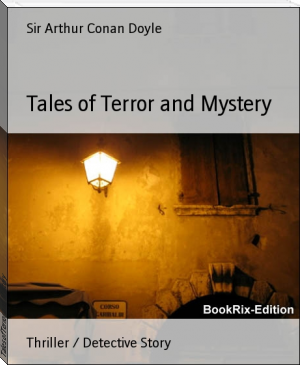
- Author: Sir Arthur Conan Doyle
Book online «Tales of Terror and Mystery by Sir Arthur Conan Doyle (popular romance novels txt) 📕». Author Sir Arthur Conan Doyle
There was, it seems, no sign of the creature, and no bloodstain which would show that my bullet had found him as he passed. Save for my own plight and the marks upon the mud, there was nothing to prove that what I said was true.
Six weeks have now elapsed, and I am able to sit out once more in the sunshine. Just opposite me is the steep hillside, grey with shaly rock, and yonder on its flank is the dark cleft which marks the opening of the Blue John Gap. But it is no longer a source of terror. Never again through that ill-omened tunnel shall any strange shape flit out into the world of men. The educated and the scientific, the Dr. Johnsons and the like, may smile at my narrative, but the poorer folk of the countryside had never a doubt as to its truth. On the day after my recovering consciousness they assembled in their hundreds round the Blue John Gap. As the Castleton Courier said:
"It was useless for our correspondent, or for any of the adventurous gentlemen who had come from Matlock, Buxton, and other parts, to offer to descend, to explore the cave to the end, and to finally test the extraordinary narrative of Dr. James Hardcastle. The country people had taken the matter into their own hands, and from an early hour of the morning they had worked hard in stopping up the entrance of the tunnel. There is a sharp slope where the shaft begins, and great boulders, rolled along by many willing hands, were thrust down it until the Gap was absolutely sealed. So ends the episode which has caused such excitement throughout the country. Local opinion is fiercely divided upon the subject. On the one hand are those who point to Dr. Hardcastle's impaired health, and to the possibility of cerebral lesions of tubercular origin giving rise to strange hallucinations. Some idee fixe, according to these gentlemen, caused the doctor to wander down the tunnel, and a fall among the rocks was sufficient to account for his injuries. On the other hand, a legend of a strange creature in the Gap has existed for some months back, and the farmers look upon Dr. Hardcastle's narrative and his personal injuries as a final corroboration. So the matter stands, and so the matter will continue to stand, for no definite solution seems to us to be now possible. It transcends human wit to give any scientific explanation which could cover the alleged facts."
Perhaps before the Courier published these words they would have been wise to send their representative to me. I have thought the matter out, as no one else has occasion to do, and it is possible that I might have removed some of the more obvious difficulties of the narrative and brought it one degree nearer to scientific acceptance. Let me then write down the only explanation which seems to me to elucidate what I know to my cost to have been a series of facts. My theory may seem to be wildly improbable, but at least no one can venture to say that it is impossible.
My view is--and it was formed, as is shown by my diary, before my personal adventure--that in this part of England there is a vast subterranean lake or sea, which is fed by the great number of streams which pass down through the limestone. Where there is a large collection of water there must also be some evaporation, mists or rain, and a possibility of vegetation. This in turn suggests that there may be animal life, arising, as the vegetable life would also do, from those seeds and types which had been introduced at an early period of the world's history, when communication with the outer air was more easy. This place had then developed a fauna and flora of its own, including such monsters as the one which I had seen, which may well have been the old cave-bear, enormously enlarged and modified by its new environment. For countless aeons the internal and the external creation had kept apart, growing steadily away from each other. Then there had come some rift in the depths of the mountain which had enabled one creature to wander up and, by means of the Roman tunnel, to reach the open air. Like all subterranean life, it had lost the power of sight, but this had no doubt been compensated for by nature in other directions. Certainly it had some means of finding its way about, and of hunting down the sheep upon the hillside. As to its choice of dark nights, it is part of my theory that light was painful to those great white eyeballs, and that it was only a pitch-black world which it could tolerate. Perhaps, indeed, it was the glare of my lantern which saved my life at that awful moment when we were face to face. So I read the riddle. I leave these facts behind me, and if you can explain them, do so; or if you choose to doubt them, do so. Neither your belief nor your incredulity can alter them, nor affect one whose task is nearly over.
So ended the strange narrative of Dr. James Hardcastle.
The Brazilian Cat
It is hard luck on a young fellow to have expensive tastes, great expectations, aristocratic connections, but no actual money in his pocket, and no profession by which he may earn any. The fact was that my father, a good, sanguine, easy-going man, had such confidence in the wealth and benevolence of his bachelor elder brother, Lord Southerton, that he took it for granted that I, his only son, would never be called upon to earn a living for myself. He imagined that if there were not a vacancy for me on the great Southerton Estates, at least there would be found some post in that diplomatic service which still remains the special preserve of our privileged classes. He died too early to realize how false his calculations had been. Neither my uncle nor the State took the slightest notice of me, or showed any interest in my career. An occasional brace of pheasants, or basket of hares, was all that ever reached me to remind me that I was heir to Otwell House and one of the richest estates in the country. In the meantime, I found myself a bachelor and man about town, living in a suite of apartments in Grosvenor Mansions, with no occupation save that of pigeon-shooting and polo-playing at Hurlingham. Month by month I realized that it was more and more difficult to get the brokers to renew my bills, or to cash any further post-obits upon an unentailed property. Ruin lay right across my path, and every day I saw it clearer, nearer, and more absolutely unavoidable.
What made me feel my own poverty the more was that, apart from the great wealth of Lord Southerton, all my other relations were fairly well-to-do. The nearest of these was Everard King, my father's nephew and my own first cousin, who had spent an adventurous life in Brazil, and had now returned to this country to settle down on his fortune. We never knew how he made his money, but he appeared to have plenty of it, for he bought the estate of Greylands, near Clipton-on-the-Marsh, in Suffolk. For the first year of his residence in England he took no more notice of me than my miserly uncle; but at last one summer morning, to my very great relief and joy, I received a letter asking me to come down that very day and spend a short visit at Greylands Court. I was expecting a rather long visit to Bankruptcy Court at the time, and this interruption seemed almost providential. If I could only get on terms with this unknown relative of mine, I might pull through yet. For the family credit he could not let me go entirely to the wall. I ordered my valet to pack my valise, and I set off the same evening for Clipton-on-the-Marsh.
After changing at Ipswich, a little local train deposited me at a small, deserted station lying amidst a rolling grassy country, with a sluggish and winding river curving in and out amidst the valleys, between high, silted banks, which showed that we were within reach of the tide. No carriage was awaiting me (I found afterwards that my telegram had been delayed), so I hired a dogcart at the local inn. The driver, an excellent fellow, was full of my relative's praises, and I learned from him that Mr. Everard King was already a name to conjure with in that part of the county. He had entertained the school-children, he had thrown his grounds open to visitors, he had subscribed to charities--in short, his benevolence had been so universal that my driver could only account for it on the supposition that he had parliamentary ambitions.
My attention was drawn away from my driver's panegyric by the appearance of a very beautiful bird which settled on a telegraph-post beside the road. At first I thought that it was a jay, but it was larger, with a brighter plumage. The driver accounted for its presence at once by saying that it belonged to the very man whom we were about to visit. It seems that the acclimatization of foreign creatures was one of his hobbies, and that he had brought with him from Brazil a number of birds and beasts which he was endeavouring to rear in England. When once we had passed the gates of Greylands Park we had ample evidence of this taste of his. Some small spotted deer, a curious wild pig known, I believe, as a peccary, a gorgeously feathered oriole, some sort of armadillo, and a singular lumbering in-toed beast like a very fat badger, were among the creatures which I observed as we drove along the winding avenue.
Mr. Everard King, my unknown cousin, was standing in person upon the steps of his house, for he had seen us in the distance, and guessed that it was I. His appearance was very homely and benevolent, short and stout, forty-five years old, perhaps, with a round, good-humoured face, burned brown with the tropical sun, and shot with a thousand wrinkles. He wore white linen clothes, in true planter style, with a cigar between his lips, and a large Panama hat upon the back of his head. It was such a figure as one associates with a verandahed bungalow, and it looked curiously out of place in front of this broad, stone English mansion, with its solid wings and its Palladio pillars before the doorway.
"My dear!" he cried, glancing over his shoulder; "my dear, here is our guest! Welcome, welcome to Greylands! I am delighted to make your acquaintance, Cousin Marshall, and I take it as a great compliment that you should honour this sleepy little country place with your presence."
Nothing could be more hearty than his manner, and he set me at my ease in an instant. But it needed all his cordiality to atone for the frigidity and even rudeness of his wife, a tall, haggard woman, who came forward at his summons. She was, I believe, of Brazilian extraction, though she spoke excellent English, and I excused her manners on the score of her ignorance of our customs. She did not attempt to conceal, however, either then or afterwards, that I was no very welcome visitor at
Six weeks have now elapsed, and I am able to sit out once more in the sunshine. Just opposite me is the steep hillside, grey with shaly rock, and yonder on its flank is the dark cleft which marks the opening of the Blue John Gap. But it is no longer a source of terror. Never again through that ill-omened tunnel shall any strange shape flit out into the world of men. The educated and the scientific, the Dr. Johnsons and the like, may smile at my narrative, but the poorer folk of the countryside had never a doubt as to its truth. On the day after my recovering consciousness they assembled in their hundreds round the Blue John Gap. As the Castleton Courier said:
"It was useless for our correspondent, or for any of the adventurous gentlemen who had come from Matlock, Buxton, and other parts, to offer to descend, to explore the cave to the end, and to finally test the extraordinary narrative of Dr. James Hardcastle. The country people had taken the matter into their own hands, and from an early hour of the morning they had worked hard in stopping up the entrance of the tunnel. There is a sharp slope where the shaft begins, and great boulders, rolled along by many willing hands, were thrust down it until the Gap was absolutely sealed. So ends the episode which has caused such excitement throughout the country. Local opinion is fiercely divided upon the subject. On the one hand are those who point to Dr. Hardcastle's impaired health, and to the possibility of cerebral lesions of tubercular origin giving rise to strange hallucinations. Some idee fixe, according to these gentlemen, caused the doctor to wander down the tunnel, and a fall among the rocks was sufficient to account for his injuries. On the other hand, a legend of a strange creature in the Gap has existed for some months back, and the farmers look upon Dr. Hardcastle's narrative and his personal injuries as a final corroboration. So the matter stands, and so the matter will continue to stand, for no definite solution seems to us to be now possible. It transcends human wit to give any scientific explanation which could cover the alleged facts."
Perhaps before the Courier published these words they would have been wise to send their representative to me. I have thought the matter out, as no one else has occasion to do, and it is possible that I might have removed some of the more obvious difficulties of the narrative and brought it one degree nearer to scientific acceptance. Let me then write down the only explanation which seems to me to elucidate what I know to my cost to have been a series of facts. My theory may seem to be wildly improbable, but at least no one can venture to say that it is impossible.
My view is--and it was formed, as is shown by my diary, before my personal adventure--that in this part of England there is a vast subterranean lake or sea, which is fed by the great number of streams which pass down through the limestone. Where there is a large collection of water there must also be some evaporation, mists or rain, and a possibility of vegetation. This in turn suggests that there may be animal life, arising, as the vegetable life would also do, from those seeds and types which had been introduced at an early period of the world's history, when communication with the outer air was more easy. This place had then developed a fauna and flora of its own, including such monsters as the one which I had seen, which may well have been the old cave-bear, enormously enlarged and modified by its new environment. For countless aeons the internal and the external creation had kept apart, growing steadily away from each other. Then there had come some rift in the depths of the mountain which had enabled one creature to wander up and, by means of the Roman tunnel, to reach the open air. Like all subterranean life, it had lost the power of sight, but this had no doubt been compensated for by nature in other directions. Certainly it had some means of finding its way about, and of hunting down the sheep upon the hillside. As to its choice of dark nights, it is part of my theory that light was painful to those great white eyeballs, and that it was only a pitch-black world which it could tolerate. Perhaps, indeed, it was the glare of my lantern which saved my life at that awful moment when we were face to face. So I read the riddle. I leave these facts behind me, and if you can explain them, do so; or if you choose to doubt them, do so. Neither your belief nor your incredulity can alter them, nor affect one whose task is nearly over.
So ended the strange narrative of Dr. James Hardcastle.
The Brazilian Cat
It is hard luck on a young fellow to have expensive tastes, great expectations, aristocratic connections, but no actual money in his pocket, and no profession by which he may earn any. The fact was that my father, a good, sanguine, easy-going man, had such confidence in the wealth and benevolence of his bachelor elder brother, Lord Southerton, that he took it for granted that I, his only son, would never be called upon to earn a living for myself. He imagined that if there were not a vacancy for me on the great Southerton Estates, at least there would be found some post in that diplomatic service which still remains the special preserve of our privileged classes. He died too early to realize how false his calculations had been. Neither my uncle nor the State took the slightest notice of me, or showed any interest in my career. An occasional brace of pheasants, or basket of hares, was all that ever reached me to remind me that I was heir to Otwell House and one of the richest estates in the country. In the meantime, I found myself a bachelor and man about town, living in a suite of apartments in Grosvenor Mansions, with no occupation save that of pigeon-shooting and polo-playing at Hurlingham. Month by month I realized that it was more and more difficult to get the brokers to renew my bills, or to cash any further post-obits upon an unentailed property. Ruin lay right across my path, and every day I saw it clearer, nearer, and more absolutely unavoidable.
What made me feel my own poverty the more was that, apart from the great wealth of Lord Southerton, all my other relations were fairly well-to-do. The nearest of these was Everard King, my father's nephew and my own first cousin, who had spent an adventurous life in Brazil, and had now returned to this country to settle down on his fortune. We never knew how he made his money, but he appeared to have plenty of it, for he bought the estate of Greylands, near Clipton-on-the-Marsh, in Suffolk. For the first year of his residence in England he took no more notice of me than my miserly uncle; but at last one summer morning, to my very great relief and joy, I received a letter asking me to come down that very day and spend a short visit at Greylands Court. I was expecting a rather long visit to Bankruptcy Court at the time, and this interruption seemed almost providential. If I could only get on terms with this unknown relative of mine, I might pull through yet. For the family credit he could not let me go entirely to the wall. I ordered my valet to pack my valise, and I set off the same evening for Clipton-on-the-Marsh.
After changing at Ipswich, a little local train deposited me at a small, deserted station lying amidst a rolling grassy country, with a sluggish and winding river curving in and out amidst the valleys, between high, silted banks, which showed that we were within reach of the tide. No carriage was awaiting me (I found afterwards that my telegram had been delayed), so I hired a dogcart at the local inn. The driver, an excellent fellow, was full of my relative's praises, and I learned from him that Mr. Everard King was already a name to conjure with in that part of the county. He had entertained the school-children, he had thrown his grounds open to visitors, he had subscribed to charities--in short, his benevolence had been so universal that my driver could only account for it on the supposition that he had parliamentary ambitions.
My attention was drawn away from my driver's panegyric by the appearance of a very beautiful bird which settled on a telegraph-post beside the road. At first I thought that it was a jay, but it was larger, with a brighter plumage. The driver accounted for its presence at once by saying that it belonged to the very man whom we were about to visit. It seems that the acclimatization of foreign creatures was one of his hobbies, and that he had brought with him from Brazil a number of birds and beasts which he was endeavouring to rear in England. When once we had passed the gates of Greylands Park we had ample evidence of this taste of his. Some small spotted deer, a curious wild pig known, I believe, as a peccary, a gorgeously feathered oriole, some sort of armadillo, and a singular lumbering in-toed beast like a very fat badger, were among the creatures which I observed as we drove along the winding avenue.
Mr. Everard King, my unknown cousin, was standing in person upon the steps of his house, for he had seen us in the distance, and guessed that it was I. His appearance was very homely and benevolent, short and stout, forty-five years old, perhaps, with a round, good-humoured face, burned brown with the tropical sun, and shot with a thousand wrinkles. He wore white linen clothes, in true planter style, with a cigar between his lips, and a large Panama hat upon the back of his head. It was such a figure as one associates with a verandahed bungalow, and it looked curiously out of place in front of this broad, stone English mansion, with its solid wings and its Palladio pillars before the doorway.
"My dear!" he cried, glancing over his shoulder; "my dear, here is our guest! Welcome, welcome to Greylands! I am delighted to make your acquaintance, Cousin Marshall, and I take it as a great compliment that you should honour this sleepy little country place with your presence."
Nothing could be more hearty than his manner, and he set me at my ease in an instant. But it needed all his cordiality to atone for the frigidity and even rudeness of his wife, a tall, haggard woman, who came forward at his summons. She was, I believe, of Brazilian extraction, though she spoke excellent English, and I excused her manners on the score of her ignorance of our customs. She did not attempt to conceal, however, either then or afterwards, that I was no very welcome visitor at
Free e-book «Tales of Terror and Mystery by Sir Arthur Conan Doyle (popular romance novels txt) 📕» - read online now
Similar e-books:
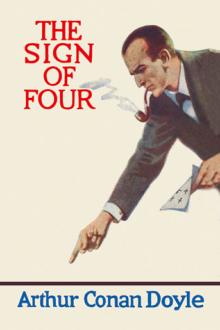
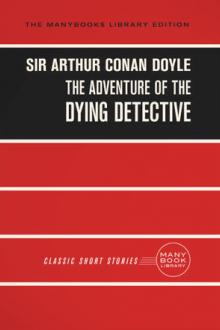
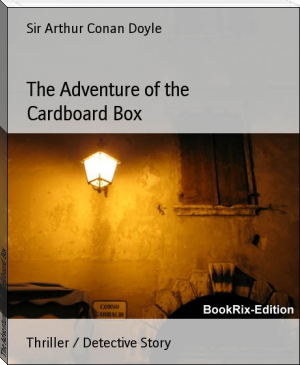
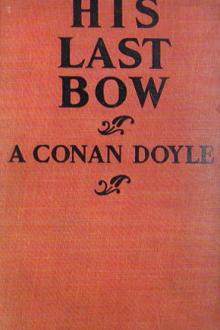

Comments (0)